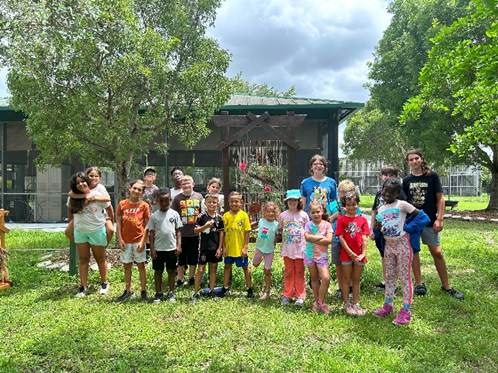
Environmental education is a vital component in creating a society that values and protects the natural world. Even greater is the importance of establishing this connection with nature during childhood. By equipping individuals, especially children, with knowledge, skills, and a sense of responsibility, environmental education fosters a deeper understanding of the range of ecosystems all around and the role humans play within them. One mission of the Sawgrass Nature Center is to showcase the significance of environmental education and its impact on children while incorporating outdoor experiences and knowledge of the natural world.
Right now, the next generation of scientists sit in their first classrooms and learn about all that the world has to offer them. This is the generation that is going to face the brunt of the climate challenges discussed today. This is why it is crucial that children gain experience with the environment, in and out of the classroom. Children who engage with environmental topics often develop a deep-rooted empathy for nature. This allows them to feel connected to the natural world. These children are also more likely to adopt sustainable habits along the way. Studies also show that integrating environmental education can enhance the overall academic performance of a child. Not only can environmental education foster skills that can be taken into the complex world, but it can embed the beauty of nature into the next generation, pushing towards a sustainable future!
More often than not, the best forms of environmental education go beyond the four walls of a classroom. Getting children outside and teaching them the true application of their knowledge can have lasting impacts. Nature-based learning can deepen the understanding of ecological concepts, provide familiarity with local ecosystems, a personal connection, and commitment to conservation efforts. Finally, time spent in green spaces can reduce stress, enhance creativity, and improve overall well-being.
Environmental education is more than a tool for understanding the natural world; it is a foundation for creating a sustainable future. By inspiring curiosity, environmental education gives individuals the skills to face the pressing environmental challenges of our time. For children, these lessons go beyond the classroom, shaping habits and values that will influence their decisions for many years. As we look to the future, investing in environmental education is investing in the well-being of our planet and the generations to come.
Sources:
https://www.neefusa.org/story/environmental-education/encouraging-youth-engagement-outdoors
https://naaee.org/programs/eeworks/benefits-k12-students?utm_source=chatgpt.com
https://www.tandfonline.com/doi/full/10.1080/00958964.2017.1366155?utm_source=chatgpt.com#abstract